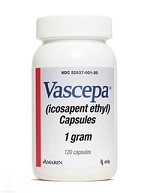Off-label marketing has another legal stamp of approval, thanks to Amarin ($AMRN) and its feisty pushback against the FDA. The Ireland-based pharma has been fighting for more than a year to promote its fish oil-derived pill for broader use, and it can now do so, even without FDA approval. And thanks to Amarin's legal maneuvering--and savvy choice of jurisdiction--any other drugmaker with truth on its side might soon do the same.
 U.S. District Judge Paul Engelmayer granted Amarin's request for an injunction against an FDA crackdown on its off-label efforts. It's no accident that Amarin--based in Ireland, with U.S. operations centered in New Jersey--sued the FDA in New York. That put the case in the Second Circuit, where an appeals court last year handed down a groundbreaking free speech case. In U.S. v. Caronia, the appeals court ruled that former Orphan Medical sales rep Alfred Caronia couldn't be prosecuted for talking up one of his drugs for an unapproved use, provided his statements were true.
U.S. District Judge Paul Engelmayer granted Amarin's request for an injunction against an FDA crackdown on its off-label efforts. It's no accident that Amarin--based in Ireland, with U.S. operations centered in New Jersey--sued the FDA in New York. That put the case in the Second Circuit, where an appeals court last year handed down a groundbreaking free speech case. In U.S. v. Caronia, the appeals court ruled that former Orphan Medical sales rep Alfred Caronia couldn't be prosecuted for talking up one of his drugs for an unapproved use, provided his statements were true.
The difference is that in the Amarin case, it's not an individual person making statements, but a company. And Engelmayer apparently thinks the same logic applies. So long as Amarin's statements about Vascepa are true, it's free to talk about the drug for an unapproved use, regardless of how the FDA might view the matter.
So now, any other drugmaker frustrated by an FDA block on off-label promotion could follow Amarin's lead and sue the agency in the Second Circuit, said ReedSmith partner Jim Beck, an attorney who also keeps tabs on the FDA via his Drug and Device Law blog.
"If a company is rock solid sure that what it's saying is true, even if the data might not support an application, it can open discussion with the FDA" about off-label marketing and ask for the agency's blessing, Beck said. And thanks to the new ruling, which granted standing to Amarin in New York, "If the FDA barks, the company can bring suit in the Second Circuit. Anyone anywhere could sue the FDA there to be covered by Caronia."
"I can't state strongly enough that the key point is truthfulness," Beck added. "A company has to be certain about what it is saying and that the underlying science supports off-label use it wishes to promote. If they are, there's now a procedure where they can get relief to spite the FDA."
The question now is how the FDA might respond to the Amarin injunction. It could appeal--in fact, it may feel forced to, now that there's a procedure by which any company could win the opportunity to promote their meds for unapproved uses. But as Beck points out, the facts in the Amarin case don't run in the agency's favor.
The FDA could also revamp its own guidelines on off-label marketing. The agency has been promising to do so for awhile, and since the Caronia decision, top officials have said they're open to the free speech argument. About the Amarin case in particular, FDA officials said they had no problem with "most" of what the company wanted to say about Vascepa's utility in patients with high triglycerides.
But though the agency said it would hold a public meeting about the free-speech issue this summer, that meeting hasn't yet happened. Nor has the agency issued any new guidelines about off-label promotion.
The Amarin injunction could spur the FDA to make a move, Beck said. "The writing has been on the wall since the Sorrell case, when the Supreme Court said pharma promotions are protected speech," he said. "This is another incentive, if the FAD chooses to follow it. It's a chance for the FDA to take a more nuanced approach."
- read the news in FiercePharma
- here's the court decision (PDF)
Related Articles:
Free speech or simply marketing? The FDA is taking that argument public
Watchdog groups decry FDA's move to let reps hand out journal articles
Free speech, PhRMA? Not in this off-label marketing case, feds say
PhRMA jumps into Integrelin off-label case, free speech arguments at the ready
Feds cry foul over Allergan's free speech defense in drug marketing case
FDA weighs the free-speech case for off-label marketing
Pharma can't be prosecuted for off-label marketing, court rules